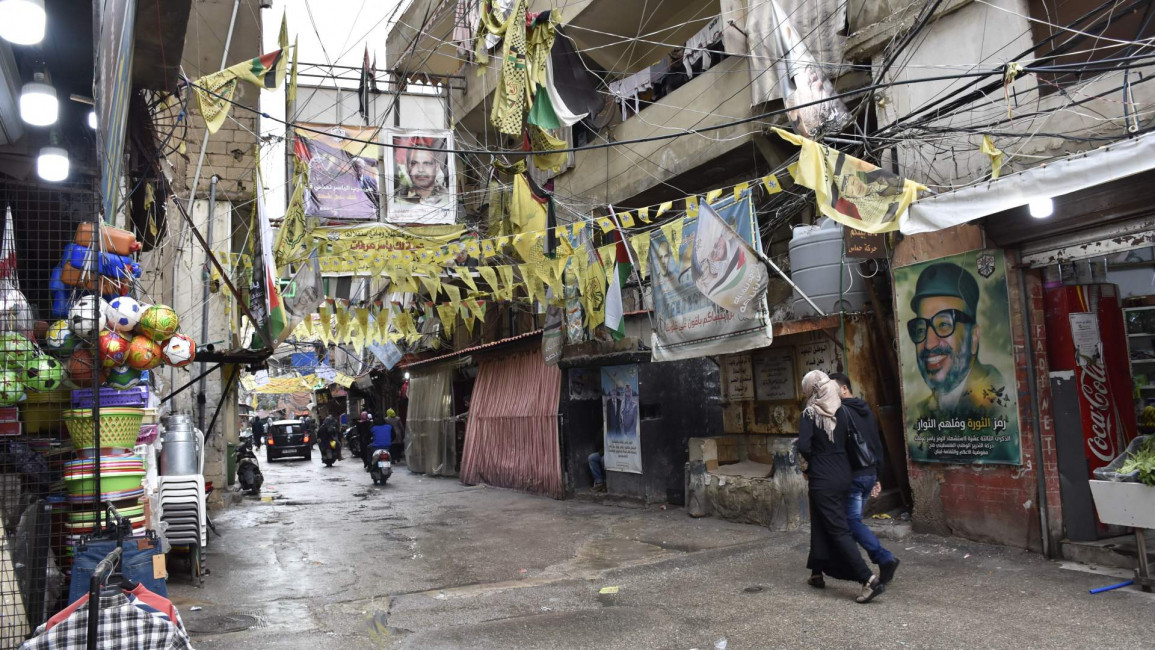Palestinian refugees in Lebanon three times more likely to die of Covid-19
Palestinian refugees in Lebanon three times more likely to die of Covid-19
UNRWA has tied the higher death rate to poverty and poor living conditions among stateless Palestinian refugees in Lebanon.
2 min read
Chronic health issues exacerbated by poor living conditions may be to blame [Getty]
Palestinian refugees are three times more likely than the Lebanese population to die with Covid-19, according to UN figures.
The dramatic impact of the coronavirus on the community has been linked to poor refugee camp conditions which aggravate chronic health issues.
Around 5,800 Palestinian refugees have tested positive for Covid-19 over the last year, Hoda Samra, a spokesperson for the United Nations Relief and Works Agency for Palestinian Refugees (UNRWA) told Reuters.
The virus was fatal for around 200 of them, Samra added.
That death rate is three time more than that recored for the general Lebanese population.
Most Palestinians who died after contracting Covid-19 suffered from chronic health conditions, which are made worse by cramped and sometimes unsanitary living conditions in refugee camps, Samra said.
Poverty has also been an aggrativing factor, Samra added, explaining that poor refugees were forced to go out to work despite the risk of coronavirus exposure.
"People go out because they can't afford to go stay home," she said.
Palestinian refugees are denied Lebanese nationality and are unable to access work in some professions. This forces many of them to make a living through low-paid work such as construction.
On Sunday, Lebanon launched its coronavirus vaccination programme.
The country has said it will vaccinate Syrian and Palestinian refugees as well as Lebanese nationals.
Beirut has so far ordered vaccine doses to cover around half of the total population.
There are concerns around take-up, however. Just 540,000 people out of a total Lebanese population of more than six million population have registered to take the vaccine so far.
Follow us on Facebook, Twitter and Instagram to stay connected
The dramatic impact of the coronavirus on the community has been linked to poor refugee camp conditions which aggravate chronic health issues.
Around 5,800 Palestinian refugees have tested positive for Covid-19 over the last year, Hoda Samra, a spokesperson for the United Nations Relief and Works Agency for Palestinian Refugees (UNRWA) told Reuters.
The virus was fatal for around 200 of them, Samra added.
That death rate is three time more than that recored for the general Lebanese population.
Most Palestinians who died after contracting Covid-19 suffered from chronic health conditions, which are made worse by cramped and sometimes unsanitary living conditions in refugee camps, Samra said.
Poverty has also been an aggrativing factor, Samra added, explaining that poor refugees were forced to go out to work despite the risk of coronavirus exposure.
"People go out because they can't afford to go stay home," she said.
Palestinian refugees are denied Lebanese nationality and are unable to access work in some professions. This forces many of them to make a living through low-paid work such as construction.
On Sunday, Lebanon launched its coronavirus vaccination programme.
The country has said it will vaccinate Syrian and Palestinian refugees as well as Lebanese nationals.
Beirut has so far ordered vaccine doses to cover around half of the total population.
There are concerns around take-up, however. Just 540,000 people out of a total Lebanese population of more than six million population have registered to take the vaccine so far.
Follow us on Facebook, Twitter and Instagram to stay connected



![Widespread famine is imminent in Gaza [Getty Images]](/sites/default/files/styles/image_212x120/public/2024-03/GettyImages-2015647000.jpg?h=199d8c1f&itok=VUMjNSXn)